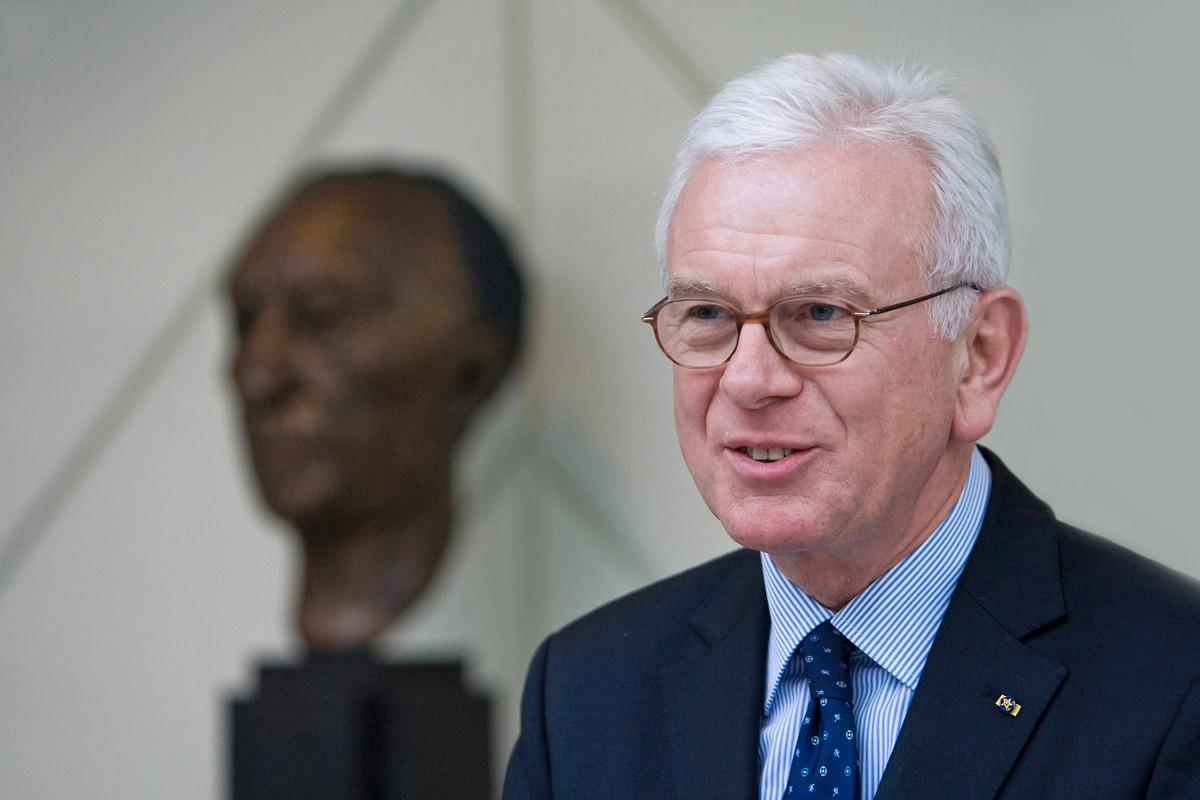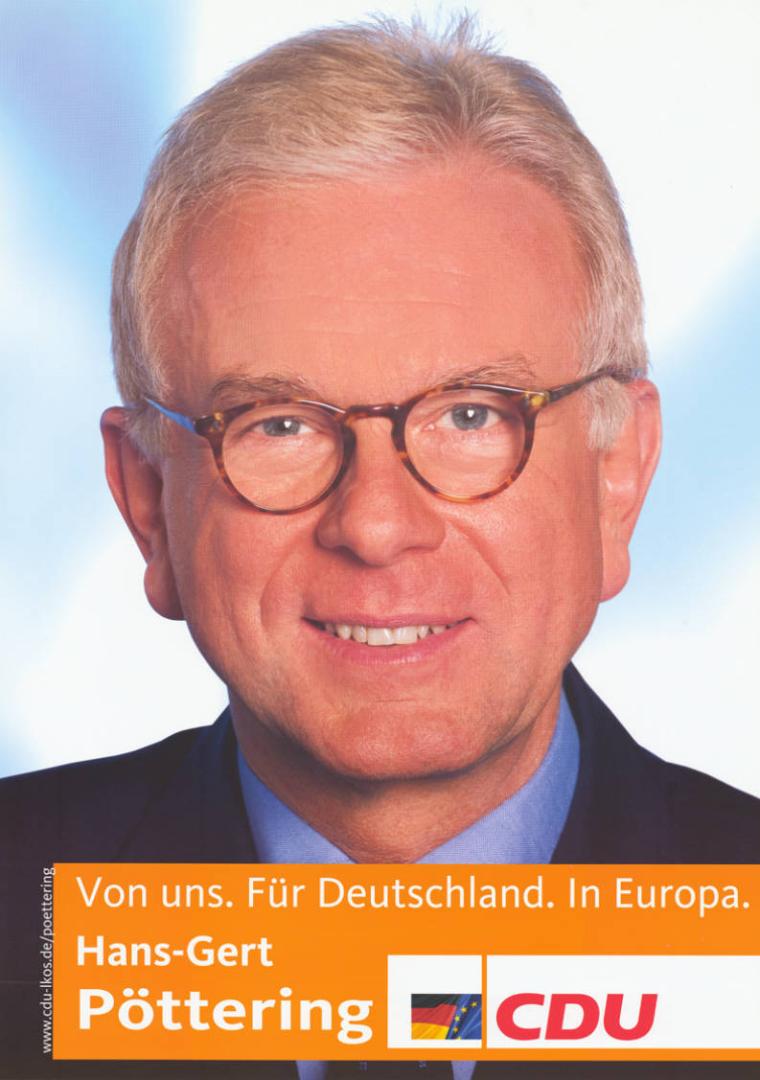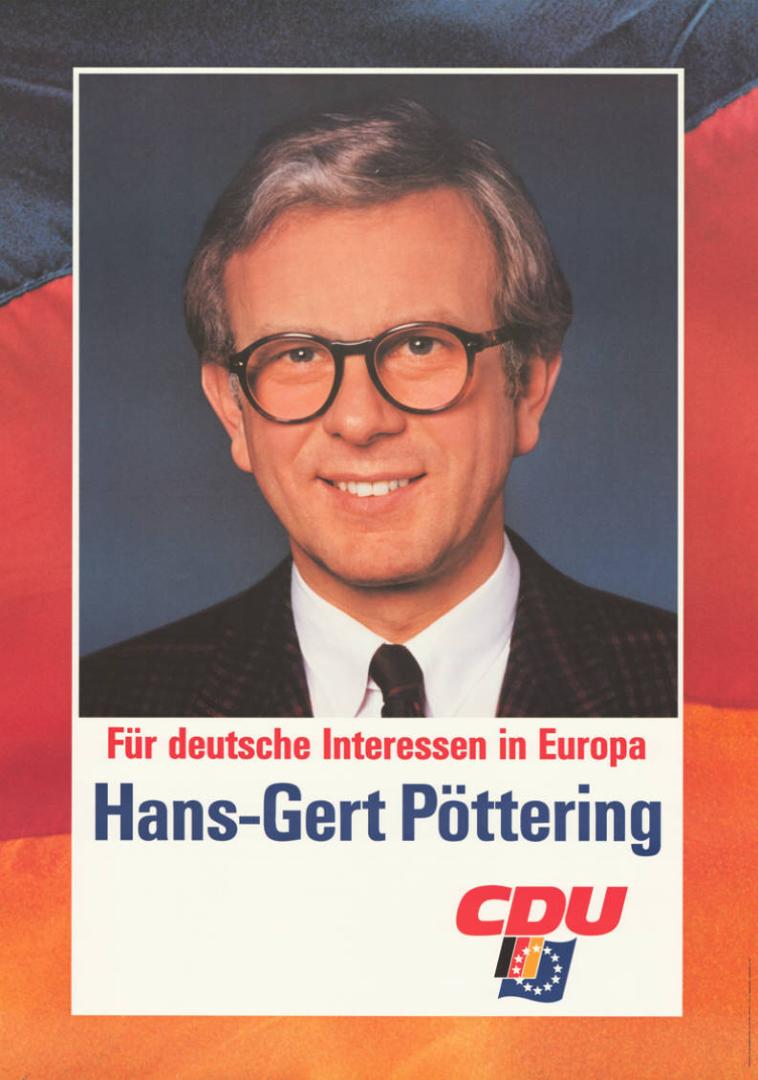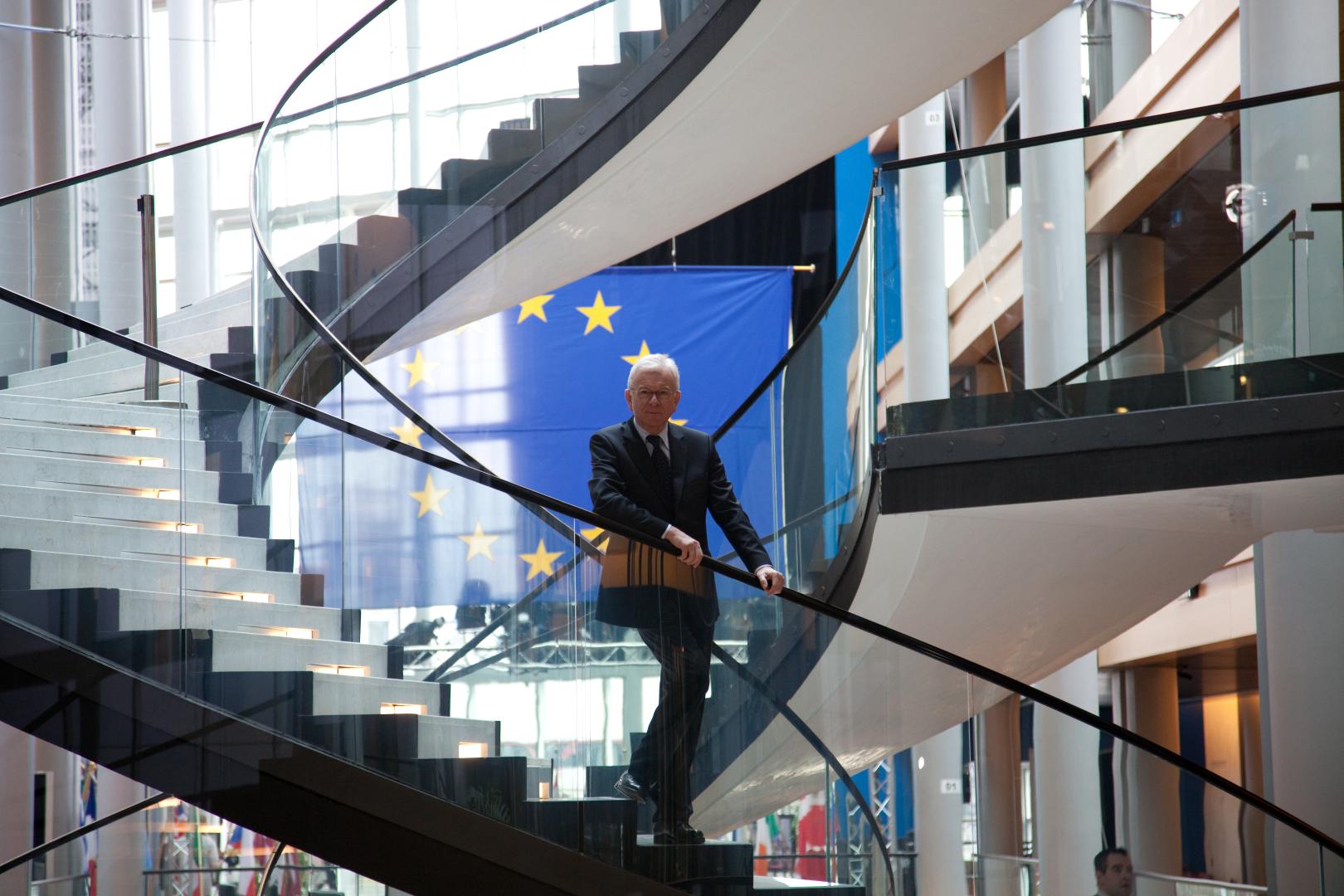Overview – Skip to a certain paragraph:
☛ School, university and Early Career
☛ Consensus and Compromise Instead of Quarrelling
☛ Top Representative of the European Parliament
☛ “We have united for the better.”
☛ Chairman of the Konrad Adenauer Foundation
Hans-Gert Pöttering did not experience the Second World War. He was born four months after the war ended, on 15 September 1945, in Bersenbrück. The horrors of Nazi dictatorship and its consequences, including millions of war dead, affected his life nonetheless: his father, Lance Corporal Wilhelm Pöttering, did not return from active service. He was presumed to have fallen during the last weeks of fighting near Stettin, at which time he was aged 35. Not knowing his whereabouts, the family hoped that he was being held as a prisoner of war and would eventually return. In the 1950s, however, he was officially declared dead. Hans-Gert and his brother Manfred, who was three years older, were raised by their mother, Agnes Sophie Pöttering. Theirs was a fate shared by many children and teenagers at the time. This experience led Hans-Gert Pöttering to decide, at an early stage of his career, that he would do what he could for the sake of a common Europe, the European idea and human rights.
School, university and Early Career
Hans-Gert Pöttering grew up in the town of Bersenbrück, where he attended primary school from 1952 to 1956, after which he went to the Carolinum grammar school in Osnabrück. In the ninth form, he switched to the Artland grammar school in Quakenbrück. After gaining his higher school certificate or Abitur in 1966, he completed two years of military service in Fürstenau and Munster, going on to study law, politics and history in Bonn and Geneva from 1968 to 1973. In 1971, he also attended Columbia University in New York as a visiting student. Pöttering sat for the First State Examination in Law in 1973 and completed the Second State Examination in Law in 1976. In 1974, he acquired a doctoral degree under the supervision of Hans-Adolf Jacobsen with a dissertation on the security policy of Konrad Adenauer (trans.: The Defence Policy Concept of the Federal German Government from 1955–1963 with Particular Consideration of U.S. Military Strategy). From 1976 to 1979, he worked as a specialist assistant to the CDU/CSU group in the Bundestag under Burkhard Ritz, the deputy leader of the parliamentary group.
Pöttering became involved in politics at an early age. During a visit to West Berlin in February 1962, the sight of the Berlin Wall prompted Pöttering to join the Junge Union, the youth organisation of the CDU and CSU. In 1964, he became a member of the CDU itself. The era of Konrad Adenauer had just come to an end, but it was Adenauer’s policy toward Europe and his commitment to peace and reconciliation with neighbouring countries that moved Pöttering to take this political stance. Ten years later, in 1974, Pöttering became chairman of the Junge Union in the Osnabrück district as well as chairman of the municipal chapter of the CDU in Bersenbrück. In 1976, he was appointed to the regional executive committee of the Junge Union in Lower Saxony, where he served as European policy spokesman.
From Bersenbrück to Europe
In 1979, when the first direct elections to the European Parliament were held, Pöttering chose what was then an uncommon path: he stood as a candidate and, at age 33, became the youngest member of the European People’s Party (EPP) Group in the European Parliament. At that time, the European Union was still called the European Economic Community (EEC). The new name was just one of many changes that Poettering experienced, as he remained a member of the European Parliament for the next 35 years. During this period, his day-to-day routine involved commuting between Brussels and Strasbourg as well as Bad Iburg, where his family lived. From his home in Bad Iburg, he represented the constituency that includes Osnabrück, Emsland, Grafschaft Bentheim and Ostfriesland. Despite his growing responsibilities at the European level, contact with local politics remained important to him: “Europe begins neither in Strasbourg nor in Brussels, but in the places that we call home,” he explained. In that spirit, he took up the post of CDU chairman for the Osnabrück district between 1990 and 2010. From there, he stood as a candidate for a seat in the European Parliament a total of seven times. On six occasions, he was the lead candidate of the Lower Saxony CDU, and in the years 2004 and 2009, he was the lead candidate of the federal CDU. From 1989 to 1999, Pöttering was also a lecturer at Osnabrück University, which appointed him honorary professor in 1995.
Back in 1979, there was a saying: “If you have a grandpa, send him to Europe.” In other words, if you went to Europe, you were on a dead-end track politically; you had no desire to shape things and have an impact; you were far from any opportunities to wield power; you were horsing around on a playground for a handful of peace-mongering idealists. But over the following 35 years, Pöttering saw up-close just how wide of the mark such disparaging comments were. After the Single European Act of 1987 and the Maastricht Treaty of 1992–93, the European Parliament gained more and more influence, as he later observed:
“Now, it was no longer possible to pass any law – in the designated fields – against the will of the European Parliament. We had been fighting for that for so long! After a little more than 14 years since its first direct election, the European Parliament had now become a legislating body.”
Today, the parliament has the last word on the budget; it has its own supervisory and legislative powers and the right to ratify treaties on international law; it also votes on the accession of new EU member states and the appointment of members to the European Commission.
After Helmut Kohl succeeded in breaking through the “Eurosclerosis” of the mid-1980s, the fall of the Berlin Wall in 1989 and the reunification of Germany opened up new opportunities for Europe to come together: Pöttering saw customs borders fall; he experienced the creation of the Euro zone and the common currency, as well as the accession of the Central European member states (2004). He refused to be discouraged by the failure of the European Constitution (2005):
“My deep inner motivation took after the principle of Konrad Adenauer: when most politicians have given up on something and consider it a lost cause, that is when the real effort has to begin.”
Consensus and Compromise Instead of Quarrelling
First, though, the young parliamentary representative faced a certain amount of drudge work in committees and working groups. Step by step, he climbed the career ladder. In the process, he received support and encouragement from colleagues with a great deal of professional and life experience, including Otto von Habsburg, Kai-Uwe von Hassel, Alfons Goppel, Wilhelm Hahn and Philipp von Bismarck.
Pöttering served as chairman of the ‘Security and Disarmament’ sub-committee of the European Parliament from 1984 to 1994. From 1994 to 1996, he led a working group of the European People’s Party (EPP) and its parliamentary group, with the title ‘Intergovernmental Conference 1996’. During this period, it formulated proposals for the Treaty of Amsterdam, which was then under negotiation. After that, he spent three years as leader of the working group of the EPP and its parliamentary group on the ‘Enlargement of the European Union’.
Far from representing a mentality of assertion and imposition, Pöttering distinguished himself instead through an impressive degree of diligence, professional expertise, and reliability. His ability to bridge differences and achieve compromises led him to the deputy chairmanship of the EPP parliamentary group from 1994 to 1999, after which he served as its chairman for seven and a half years. In 1999, “his” parliamentary group included 233 out of a total of 626 members of parliament, which made it the largest for the first time – and by a significant margin. At the end of his tenure as leader (2007), Pöttering was still at the helm of the largest group, an assemblage that represented 27 countries, 52 parties and a variety of cultures and mentalities, and he remained “firm on matters, friendly in manner.” He managed to bring together Eurosceptic Britons, liberal Christian Democrats, and nationally-minded followers of Berlusconi.
Top Representative of the European Parliament
On 16 January 2007, his ability to forge alliances across party lines brought him to the summit of his political career: Hans-Gert Pöttering assumed the presidency of the European Parliament for two and a half years. Thenceforth, much of his work involved chairing meetings, giving speeches and holding discussions throughout the world.
During the first six months of his term, the rotating presidency of the Council of the European Union was held by Germany under Chancellor Angela Merkel. The first highlight was the ‘Berlin Declaration’, which Pöttering signed on 25 March 2007 with Angela Merkel (for the European Council) and José Manuel Durấo Barroso (for the European Commission) in the company of EU leaders on the fiftieth anniversary of the Treaty of Rome. The remaining months were dominated by negotiations on both the European Charter of Fundamental Rights, which describes the values of the European Union, and the Treaty of Lisbon. Pöttering signed the Charter of Fundamental Rights on 12 December 2007 along with the then President of the European Council, Portuguese Prime Minister José Sócrates, and the President of the European Commission, José Manuel Durấo Barroso. On 21 December 2007, he attended a ceremony near the south-eastern German border town of Zittau to mark the expansion of the Schengen Zone. The border controls between Germany, Poland and the Czech Republic had now been removed.
Strengthening and expanding the European Union was not the only topic close to Pöttering’s heart, however. On trips to the Islamic-Arab world, he championed dialogue between cultures. Addressing the Knesset, the parliament of Israel, he did not shy from speaking in favour of the two-state solution to the Israeli–Palestinian conflict, and he always demanded respect for human rights – whether in Tibet, Russia, or Guantánamo. Another important concern for Hans-Gert Pöttering is the preservation of creation. On 23 April 2009, he signed the European climate-protection legislation with Petr Nečas, then the Deputy Prime Minister of the Czech Republic.
“We have united for the better.”
“We have united for the better”, was Pöttering’s summary of his long political career in behalf of Europe. It is a headnote and guiding principle of the Berlin Declaration and the title of his autobiography, which begins with the following words:
“The unification of Europe is the largest peace-building enterprise in the history, not just of our continent but of the entire world. To many, this historical observation and assessment may seem exaggerated, inappropriate, or even pompous, but it remains true. (…) People too easily forget what a long road Europeans have travelled from a continent of enmity to a European Union that affirms the bond of shared values and in which over 500 million people from 28 countries now live together, ‘united in diversity’. Only if we know where we come from, can we know who we are and decide where we want to go.”
While serving as president of the European Parliament, Pöttering initiated the House of European History project in order to help Europeans learn more about their own history and contribute to an understanding of Europe’s development, especially among young people. In his inaugural speech as the newly elected president of the European Parliament on 13 February 2007, he put his initial ideas for the project into concrete terms. The Bureau of the European Parliament approved of his idea and, on 15 December 2008, adopted the ‘Conceptual Basis for a House of European History’, which had been formulated by a committee of experts. An advisory committee and board of trustees were then appointed with the remit of communicating European history to the general public and setting up the institution in Brussels.
Pöttering declined to stand as a candidate in the European parliamentary elections on 25 May 2014. Up until then, he was the only member who had been serving ever since the first direct elections in 1979. Pöttering has received many awards for his achievements, be it the Citizen of Honour, from his home town of Bersenbrück, or the Grand Cross of Merit with Star and Sash, from the Federal Republic of Germany. Three further distinctions are worth noting here, because of the particular history of the Pöttering family in relation to Poland – as he relates in his autobiography, Hans-Gert Pöttering visited the war cemetery of Stare Czarnowo in Poland in May 2011, where, on a commemorative plaque, he found the name of the father he never knew. In September of the same year, Jerzy Buzek, a former president of the European Parliament, and Hans-Gert Pöttering, who preceded him in office, were presented with the Polish-German Prize in Warsaw. In his acceptance speech, Pöttering underscored “what a long way we have come, for the better, in Poland, Germany and the European Union.” Upon receiving an honorary doctorate from the University of Wrocław in 2014, he affirmed:
“Reconciliation and friendship with Poland has been a theme of my entire political career. The crucial steps toward reconciliation originated in Poland! Without the pastoral letter of the Polish bishops in 1965 – ‘we (...) grant forgiveness and ask for forgiveness’ – without the courageous people of the Solidarność [Solidarity] movement, and without the pope from Poland, John Paul II, this transformation in the middle of Europe would have been impossible. Let us Germans never forget that we owe the reunification of our country in part to our Polish neighbours’ desire for freedom.” Also in 2014, Hans-Gert Pöttering and Jerzy Buzek were awarded the honorary citizenship of the Silesian town of Opole (Oppeln).
Chairman of the Konrad Adenauer Foundation
On 4 December 2009, Pöttering was elected to succeed Bernhard Vogel in the honorary post of chairman of the Konrad Adenauer Foundation. He had come full circle, considering that Konrad Adenauer was his intellectual and political role model when he joined the CDU at the age of 19. In this new role, he again had many opportunities to work toward a Europe of ever closer union and for the protection of human rights. On 1 January 2018, Pöttering handed over the position to Norbert Lammert.
The ‘marathon European’, as he has been called, likes to relax by skiing in the mountains, swimming, and reading historical novels — as well as enjoying a generous helping of spaghetti bolognese.
The original text was translated into English by Richard Toovey.
Curriculum vitae
Education and Academic Career:
- 15 September 1945 Born in Bersenbrück, Lower Saxony
- 1966 Abitur, then two years of military service, reserve officer
- 1968–1973 Studies law, politics and history at the University of Bonn and the University of Geneva, as well as at the Geneva Graduate Institute (IHEID)
- 1971 Visiting student at Columbia University in New York
- 1973 First State Examination in Law
- 1974 Awarded doctorate
- 1976 Second State Examination in Law
- 1976–1979 Assistant to CDU/CSU group in the Bundestag
- 1989 Appointed lecturer at Osnabrück University
- 1995 Appointed honorary professor at Osnabrück University
Political Activity and Honorary Positions:
- 1994–1996 Leader of ‘Intergovernmental Conference 1996’ working group of the European People’s Party (EPP) and its parliamentary group, the proposals of which served as the basis for the EPP position on the Treaty of Amsterdam
- 1996–1999 Leader of the ‘Enlargement of the European Union’ working group of the EPP and EPP Group
- 1997–1999 President of Europa-Union Deutschland
- 1999–2007 Chairman of the parliamentary group of the European People’s Party (Christian Democrats) and the European Democrats (EPP-ED) in the European Parliament
- 1999–2009 Member of the Federal Board of the CDU, member of the CDU Federal Executive Committee
- 1999–2009 Member of the collective Presidency of the European People’s Party (EPP)
- January 2007–July 2009 12th President of the European Parliament since the first direct elections
- 2008–2009 President of the Euro-Mediterranean Parliamentary Assembly (EMPA)
- 2008–2014 Chairman of the Working Group on the Middle East in the European Parliament
- 2008 Co-founder, with André Leysen, of the European Charlemagne Youth Prize
- 2010–present Member of the Board of Directors of the Society for the Awarding of the International Charlemagne Prize in Aachen e. V
- 2010–2017 Chairman of the Konrad Adenauer Foundation
- July 2014–present Honorary member of the European Parliament
- 2009–present Chairman of the Board of Trustees of the House of European History in Brussels
Honours and Awards (Selection)
- 1995 Robert Schuman Medal of the EPP group
- 2002 Grand Decoration of Honour in Gold for Services to the Republic of Austria
- 2002 ‘Mérite Européen en or’, Luxemburg
- 2006 Doctor Honoris Causa of Babeş-Bolyai University in Cluj-Napoca, Romania
- 2007 Grand Cross of the Papal Order of St Gregory
- 2007 Doctor Honoris Causa of the University of Opole, Poland
- 2007 Grand Order of Queen Jelena with Sash and Morning Star, Croatia
- 2007 Walter Hallstein Prize, Frankfurt am Main
- 2008 Doctor Honoris Causa of the Warmia and Mazury University in Olsztyn, Poland
- 2008 Grand Cross of Merit of the Republic of Italy, ‘Cavaliere di Gran Croce Ordine al Merito della Repubblica Italiana’
- 2009 Citizen of Honour of the town of Bersenbrück, his birthplace
- 2009 Medal of Prince Yaroslav the Wise, ‘Řád prince Jaroslava Moudrého’ (Nejvyšší ukrajinské vyznamenání), Ukraine
- 2009 Commander Grand Cross of the Order of the Three Stars of the Republic of Latvia
- 2010 Ben Gurion Medal of Ben Gurion University Jerusalem
- 2010 Grand Cross of Merit with Star and Sash of the Federal Republic of Germany
- 2010 Doctor Honoris Causa of the University of Korea, Seoul
- 2010 René Cassin Medal for Human Rights, Consultative Council of Jewish Organisations
- 2011 Commander of the National Order of the Legion of Honour of France
- 2011 Grand Cross of the Order of Civil Merit of the Kingdom of Spain
- 2011 Polish-German Prize
- 2011 Doctor Honoris Causa of Miguel de Cervantes University, Santiago de Chile
- 2012 Doctor Honoris Causa of Bahçeşehir University in Istanbul, Turkey
- 2012 Cardinal Opilio Rossi Medal from the Consortium of Catholic Organisations in Vienna
- 2013 Knight Commander's Cross of the Order of Merit of the Republic of Poland
- 2013 Commander’s Cross of the Order of Merit of the Republic of Lithuania
- 2013 Order of Merit with Grand Cross of the Republic of Hungary
- 2013 The Order of the Cross of Terra Mariana 1st class of the Republic of Estonia
- 2014 Grand Cross of the Order of the Star of Romania
- 2014 Doctor Honoris Causa of the University of Wrocław, Poland
- 2014 Doctor Honoris Causa of Ateneo de Manila University, Philippines
- 2014–present Honorary Citizen of the city of Opole, Silesia (Poland)
- 2015–present Honorary Professor at the Pontifical Catholic University of Argentina Santa María de los Buenos Aires
- 2016 Grand Officer of the Republic of Tunisia
- 2017 Honorary Senior Fellowship of Regent’s University London
- 2017 Doctor Honoris Causa of Kobe University, Japan
- 2017 Doctor Honoris Causa of the École Supérieure de Commerce de Paris
- 2017 Doctor Honoris Causa of the European Humanities University, Vilnius
- 2019 Hermann Ehlers Prize
Publications
- Adenauers Sicherheitspolitik 1955 – 1963. Ein Beitrag zum deutsch-amerikanischen Verhältnis. Mit einem Vorwort von Hans-Adolf Jacobsen (Bonner Schriften zur Politik und Zeitgeschichte 10). Düsseldorf 1975 (Dissertation).
- Mit Frank Wiehler: Die vergessenen Regionen. Plädoyer für eine solidarische Regionalpolitik in der Europäischen Gemeinschaft. Baden-Baden 1983 (auch Niedersächsische Landeszentrale für Politische Bildung. Hannover 1983.)
- Mit Ludger Kühnhardt: Europas vereinigte Staaten. Annäherungen an Werte und Ziele (Texte + Thesen 237). Zürich 1991.
- Mit Ludger Kühnhardt: Weltpartner Europäische Union (Texte + Thesen 252). Zürich 1994.
- Die Einigung Europas in der Perspektive des Jahres 2000 (Brüsseler Vorträge der Konrad-Adenauer-Stiftung 12). Bonn 1995 (Antrittsvorlesung als Honorarprofessor an der Universität Osnabrück).
- Mit Ludger Kühnhardt: Kontinent Europa. Übergänge, Grenzen (Texte + Thesen 276). Zürich 1998.
- Von der Vision zur Wirklichkeit. Auf dem Weg zur Einigung Europas. Bonn 2004.
- Im Dienste Europas. Reden aus den Jahren 2007 – 2009. Mit einem Vorwort von Helmut Kohl. Bonn 2009.
- Mit Gerd Kaldrack (Hg.): Eine einsatzfähige Armee für Europa: die Zukunft der Gemeinsamen Sicherheits- und Verteidigungspolitik nach Lissabon (Forum Innere Führung 34). Baden-Baden 2011.
- Wir sind zu unserem Glück vereint. Mein europäischer Weg. Köln/Weimar/Wien 2014.
- Mein Europa: Werte, Überzeugungen, Ziele. Freiburg/Br. 2015.
- Online-Auswahl: Reden als Vorsitzender der Konrad-Adenauer-Stiftung.
Literature
- Michael Borchard (Hrsg.), Deutsche Christliche Demokraten in Europa. Sankt Augustin/Berlin 2020.
- Michael Gehler / Marcus Gonschor "Ein europäisches Gewissen" Hans-Gert Pöttering, Biografie, Herder-Verlag Freiburg/Brg. 2020.
- Michael Gehler, Marcus Gonschor: A European Conscience: A biography of Hans-Gert Poettering. John Harper Publishing (London) 2022.
- Olaf Wientzek, Europapolitik. "Europa als historisches Fundament der deutschen christlichen Demokratie" in: Norbert Lammert (Hg.) "Handbuch zur Geschichte der CDU - Grundlagen, Entwicklungen, Positionen." Darmstadt 2022, S. 593-600.






